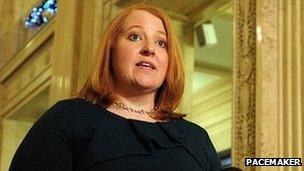Two Northern Ireland MPs back Commons same-sex marriage bill
- Published

Alliance MP Naomi Long voted in favour of the bill being passed.
Out of the 13 NI MPs eligible to vote on the gay marriage bill, two voted for it to be passed, nine voted against the bill and two did not vote.
MPs have approved same-sex marriage in England and Wales in a key House of Commons vote.
The Commons voted in favour of the Marriage (Same Sex Couples) Bill, by 400 to 175, a majority of 225, at the end of a full day's debate on the bill.
Local campaign group, Equal Marriage NI, has welcomed the move.
The bill was supported by SDLP's Mark Durkan (Foyle) and Alliance MP Naomi Long (Belfast East).
The bill was opposed by DUP MPs Gregory Campbell (Londonderry East), Nigel Dodds (Belfast North), Jeffrey Donaldson (Lagan Valley), Rev William McCrea (Antrim South), Ian Paisley Junior (Antrim North), Jim Shannon (Strangford), David Simpson (Upper Bann), Sammy Wilson (Antrim East) and independent MP Lady Sylvia Hermon (North Down).
The SDLP's Margaret Ritchie (South Down) and Alasdair McDonnell (Belfast South) did not vote.
As Sinn Fein MPs do not take their seats in Westminster they were not able to vote.
Northern Ireland Secretary of State, Theresa Villiers, also voted in favour of the bill being passed.
'Victory for equality'
The chairman of the Equal Marriage NI, John O'Doherty has welcomed the vote: "What we saw in Westminster was a victory for equality and a victory for decency.
"The tone of the debate in the House of Commons was overwhelmingly measured and respectful. Those who are opposed to equal marriage, with the notable exception of DUP MPs, largely made their contributions without resorting to fallacy and hyperbole," he said.
Campaign group Equal Marriage NI have welcomed the vote in the commons.
"We thank Maria Miller MP for bringing this bill to the House of Commons today and for the governments excellent intentions of ensuring that all loving couples, regardless of their gender or sexual orientation, have the same right to marry and form a family.
"However, we do have concerns with the current version of the bill, particularly the provisions which mean that a couple legally married in England or Wales will have their relationship only recognised as a civil partnership in Northern Ireland," he said.
"This would result in an untenable anomaly. As the bill enters committee stage we will seek to work closely with members of all parties and ensure that an amendment is introduced so that a couple married anywhere in the UK will be recognised as such everywhere in the UK."
Speaking after the debate Naomi Long MP, who supported the bill said: "As a Christian and a liberal, I believe that equality and religious freedom are fundamental to a democratic society and that both must be promoted and protected, a position which is reflected in our policy and also in the bill.
"I believe that the government have set out clearly their intention to provide both equality of access and robust protections for faith groups who do not in conscience support same-sex civil marriage, ensuring that they will not be forced to conduct same-sex marriage ceremonies or have them conducted on their premises, or be prevented from expressing their views on the matter," she said.
"It is also important in the context of religious freedom, that those faith groups who wish, in conscience, to marry same-sex couples are able to do so without being prevented by the state, something which is also contained in the bill."
- Published5 February 2013
- Published5 February 2013
- Published4 June 2013
- Published1 October 2012
- Published31 July 2012
- Published17 June 2012